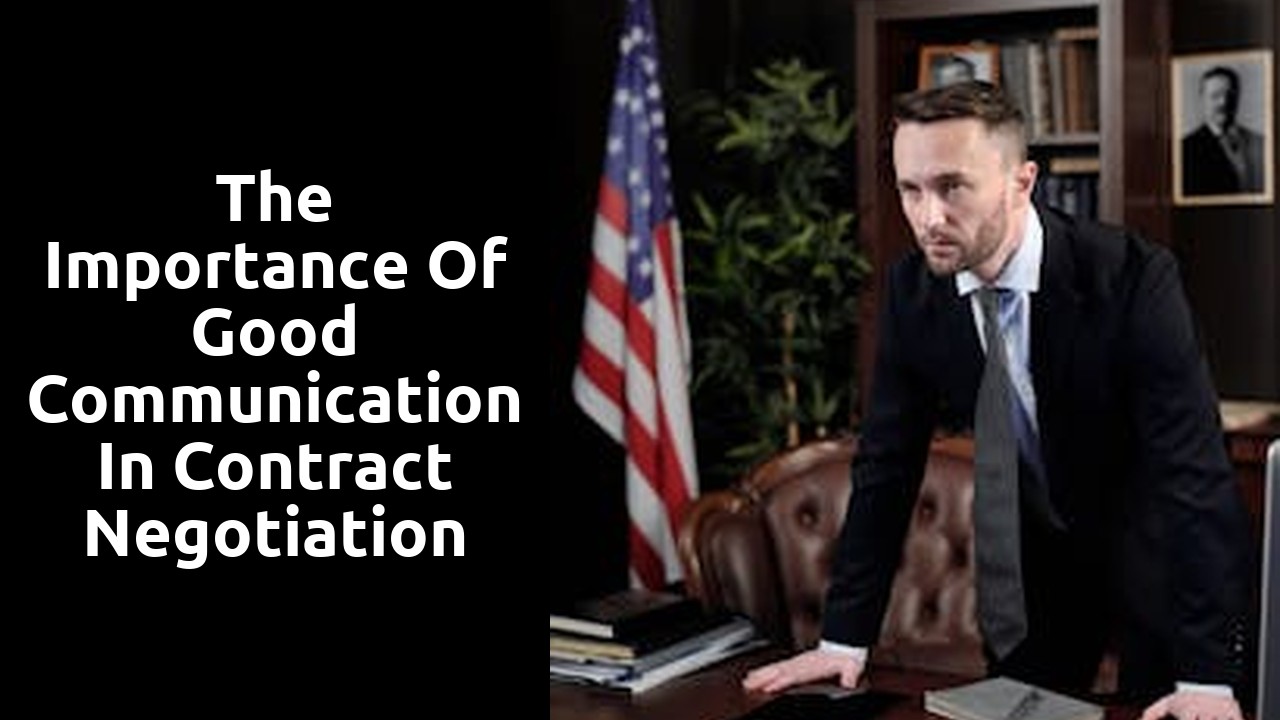The Importance of Good Communication in Contract Negotiation

Enhancing Agreement Success: Unlocking the Power of Effective Communication
Effective communication is the driving force behind successful agreements. It plays a crucial role in ensuring that all parties involved are on the same page and have a clear understanding of their roles, responsibilities, and objectives. Clear and concise communication helps to build trust and minimize misunderstandings, paving the way for effective collaboration and problem-solving. When all parties have a shared understanding of the terms and conditions of a contract, they are more likely to work towards achieving mutual goals and resolving conflicts amicably.
In addition to fostering a shared understanding, effective communication also allows for effective negotiation. Clear and concise communication helps to articulate needs, interests, and concerns, enabling parties to find common ground and reach mutually beneficial agreements. By actively listening and openly discussing issues, all parties can address any potential misunderstandings or gaps in knowledge, resulting in stronger and more robust agreements. Moreover, effective communication fosters transparency and openness, creating an environment where parties feel comfortable expressing their viewpoints and finding creative solutions to any challenges that may arise.
Navigating Contracts: The Key Role of Clear Communication
Clear communication plays a pivotal role in navigating contracts successfully. Contracts are complex agreements that require a comprehensive understanding of the terms, obligations, and expectations of all parties involved. Effective communication ensures that all parties are on the same page, providing clarity and minimizing the potential for misunderstandings or disputes.
One way clear communication enhances contract navigation is by ensuring that all terms and conditions are articulated precisely. This means that each party involved understands their rights and responsibilities, as well as the consequences of non-compliance. When expectations are clearly communicated, there is a higher likelihood of fulfillment, reducing the risk of breach and potential legal actions. Clear communication also allows for the efficient resolution of any disagreements or conflicts that may arise during the contractual period. By openly and effectively addressing concerns, parties can work towards mutually beneficial solutions, fostering a positive and productive working relationship.
Building Bridges: How Effective Communication Can Strengthen Contract Negotiation
Effective communication is a key component in building strong bridges during contract negotiations. When parties are able to clearly express their interests, concerns, and expectations, misunderstandings can be minimized and common ground can be established. This not only enhances the overall success of the agreement but also fosters a sense of trust and collaboration between the parties involved.
One way effective communication strengthens contract negotiation is by ensuring that all parties have a thorough understanding of the terms and conditions of the agreement. By clearly conveying information, such as timelines, deliverables, and payment terms, potential disputes can be avoided. Additionally, effective communication allows for open and honest discussions about potential risks and uncertainties, enabling parties to address them proactively and find mutually beneficial solutions. This level of transparency and engagement facilitates a smoother negotiation process and increases the likelihood of a successful outcome for all parties involved.
The Hidden Ingredient to Successful Contracts: Communication Strategies Unveiled
Effective communication is often overlooked as a crucial component in the success of contracts. However, it is the hidden ingredient that can make or break the outcome of any negotiation. Communication strategies play a pivotal role in navigating the complexities and challenges that arise during the contract process.
One key aspect of effective communication in contract negotiation is clarity. It is imperative that all parties involved have a clear understanding of the terms and expectations outlined in the contract. Ambiguity can lead to misunderstandings and disputes down the line. Therefore, using concise and straightforward language is essential to promote transparency and ensure that everyone is on the same page. Additionally, active listening and clear expression of ideas can foster a collaborative environment, where concerns and issues can be openly addressed and resolved. By leveraging effective communication strategies, contracts can be crafted with precision and efficiency, setting the foundation for successful agreements.
Breaking Barriers: How Communication Skills Can Make or Break Contract Negotiations
Effective communication skills are a fundamental ingredient in the success or failure of contract negotiations. In a world where contracts can be complex and multifaceted, the ability to convey ideas clearly and concisely is paramount. Without strong communication skills, misunderstandings can arise, leading to unnecessary delays or even the complete breakdown of negotiations. Additionally, communication skills play a crucial role in building trust and rapport between parties involved in the negotiation process. By fostering an open and transparent line of communication, parties are more likely to feel heard and understood, increasing the likelihood of reaching mutually beneficial agreements.
Communication: The Secret Weapon for Smooth Contract Negotiations
Communication plays a crucial role in the success of contract negotiations. It is often underestimated, but effective communication can be the secret weapon that ensures smooth and productive discussions. When parties are able to clearly convey their thoughts, concerns, and expectations, misunderstandings are minimized and agreements are more likely to be reached.
One key aspect of effective communication in contract negotiations is active listening. Each party needs to listen attentively to the other side's needs and desires, as well as understand their perspective. This helps build trust and fosters an atmosphere of collaboration. Additionally, active listening allows parties to identify any potential conflicts or differences early on, enabling them to address these issues and find mutually beneficial solutions.
Related Links
Negotiating International Contracts: Cultural ConsiderationsUnderstanding the Process of Contract Negotiation
Tips for Negotiating Contracts in a Competitive Market
Best Practices for Contract Negotiation in the Digital Age
Key Elements to Consider in Contract Negotiation
Role of Lawyers in Contract Negotiation
Essential Skills for Successful Contract Negotiation